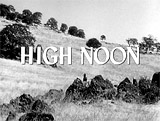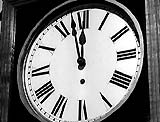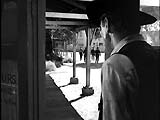
|
High Noon
(1952)
In Fred Zinnemann's classic and tense black and white
revisionist Western (shot virtually in 'real-time') - it was frequently
interpreted as a parable (or allegorical tale) about artists left
to "stand alone" and face persecution and accusations of being Communist during the HUAC
Hollywood blacklisting of the McCarthy hearings in the early 1950s;
it provided a similar plot for the sci-fi film Outland
(1981) starring
Sean Connery:
- the legendary western provided
a masterful portrayal of a deserted, newly-married and retiring Marshal Will
Kane (Oscar-winning Gary Cooper) left alone in the western town
of Hadleyville (in the New Mexico Territory) in the mid-1870s,
pitted against three vengeful gunslingers led by gang-leader Frank
Miller (Ian MacDonald); the principled lawman awaited a suspenseful, fateful showdown
with ruthless bandits returning to the small town to seek revenge; the
film was enhanced by Dimitri Tiomkin's title ballad "Do Not Forsake
Me, O My Darlin'" (sung by Tex Ritter)
- the middle-aged Kane had just been married to pacifist
Quaker bride Amy Fowler (Grace Kelly) at 10:35 am, when he learned that
a mean outlaw (that Kane had sent to prison five years earlier)
had just been pardoned by liberal abolitionists and released, and
was arriving in town at noon on the train to meet up with his gang,
including Miller's younger brother Ben Miller (Sheb Wooley), Jack
Colby (Lee Van Cleef in his film debut), and James Pierce (Robert
J. Wilke)
- Kane had left town with Amy for a
new life in nearby Clarksburg, to raise a family, but a few miles
out of town, Kane had second thoughts: "It's no good. I've
got to go back, Amy...They're making me run. I've
never run from anybody before," and they rode back to town
- back in the Marshal's office in town, Amy begged
her resolute new husband to reconsider: ("Don't try to be a hero.
You don't have to be a hero, not for me"); then, she defiantly
handed him an ultimatum on her wedding day: if he wouldn't go away
with her, she would go alone by train to St. Louis - on the one
that departed at twelve noon: ("If you won't go with
me now, I'll be on that train when it leaves here")
- much of the film was composed of Kane's agonized wait for the noon train
- with numerous, repetitive, large closeup views of clocks ticking
in 'real time'; with integrity and a strong sense of justice, duty, and loyalty,
he placed everything on the line
- Judge Percy Mettrick (Otto Kruger) who had sentenced
Miller and officiated at Kane's marriage, was found packing his
bags to 'forsake' the community, and urged Kane to do the same
("Have you forgotten that I'm the man who passed sentence
on Frank Miller?")
- in the local church, Kane delivered a beleaguered
plea as he sought to enlist deputies and gain support to help him
defend the town against vengeful gunslingers about to arrive: ("It
looks like Frank Miller's comin' back on the noon train. I need all
the special deputies I can get")
- one of the influential spokespersons in the church, the
town's Senior Selectman and Mayor Jonas Henderson (Thomas Mitchell),
feared that a violent shoot-out would create a bad image for Hadleyville
up North, especially for financial growth and investment support
from Northern business interests. But then he concluded by advising
Kane to flee town for the good of the local economy: ("He
didn't have to come back here today. And for his sake and the sake
of this town, I wish he hadn't. Because if he's not here when Miller
comes, my hunch is there won't be any trouble, not one bit. Tomorrow,
we'll have a new Marshal. And if we can all agree here to offer him
our services, I think we can handle anything that comes along. And
to me, that makes sense. To me, that's the only way out of this.
Will, I think you'd better go while there's still time. It's better
for you, and it's better for us"); Kane left the church empty-handed
- Kane's next visit was to the house of aging,
discarded, arthritic, and embittered ex-marshal Matt Howe (Lon Chaney,
Jr.), Kane's predecessor, who offered his cynical opinion to Kane about
his past profession as a life-long 'tin-star' lawman: ("It's a
great life. You risk your skin catchin' killers and the juries turn
'em loose so they can come back and shoot at ya again. If you're honest,
you're poor your whole life, and in the end you wind up dyin' all alone
on some dirty street. For what? For nothin'. For a tin star");
Kane realized that he would be left single-handed to face the desperadoes
- functioning as the ex-mistress of both
Frank Miller and Kane, and as Harvey Pell's current girlfriend, the
worldly-wise, half-Mexican saloon owner and businesswoman Helen Ramírez
(Katy Jurado) at the Ramirez Saloon had just negotiated to sell her
saloon before quickly departing from town; in the hotel, she met
Amy and advised her to not abandon her husband: "What kind of
woman are you? How can you leave him like this?...If Kane was my
man, I'd never leave him like this. I'd get a gun. I'd fight"
- in the town's livery stable, Kane engaged in a vicious
fist-fight with his embittered, cowardly young ex-deputy Harvey Pell
(Lloyd Bridges) who had earlier attempted to manipulatively blackmail
him into succeeding him as the next Marshal in exchange for helping
to defend the town

The Ever-Present Clocks Ticking Toward High Noon
|

The Arrival of Members of the Miller Gang
|

Kane Writing His Last Will and Testament
|
- anticipating his own death at a few minutes before
twelve 'high noon,' Kane wrote his own last will and testament
in his office; he heard the noon train's whistle
from afar
- a long, upward-moving crane shot pulled back,
revealing the Marshal's forsakenness amidst the storefronts and rooftops
of the small community. His tiny and solitary figure slowly strode
down the middle of the dirt street toward a gripping shootout sequence
with the four killers. All alone, he had been utterly betrayed
- no one was there to come to his aid: the Judge, his immature
deputy, and all his friends and townspeople had turned their backs
on him
- in the exciting final shootout,
Kane confronted the four desperadoes at noon who walked into town
from the station; early on, Kane shot and killed Ben Miller on the
street and then from a barn's hayloft, he shot and killed Colby,
but was wounded (shot in the left arm) when he fled from the burning
barn
- unbeknownst to Kane, Amy (who was on her way back
to town from the train station) came to her husband's aid; she gunblasted
Pierce from behind through a broken window; but then, after being
grabbed by Frank Miller as a hostage, Amy fought him off by clawing
at his face and was pushed to the ground; with a clear shot, Kane
killed Miller and then relieved that it was all over, he embraced
Amy
- in the film's conclusion after vanquishing the killers,
Kane disavowed the ungrateful town by contemptuously throwing his star-shaped badge into the
dirt at his feet, and then rode off in his packed buckboard wagon
with Amy
- the contemptible crowd that was unwilling
to fight to preserve its law and order remained silent as the buckboard
went out of view, accompanied by the first words of the title song
'High Noon's' famous melancholy ballad: ("Do not forsake
me, oh my darlin'...")
|

Opening Marriage Ceremony Between Marshal Kane and Quaker
Pacifist Amy Fowler (Grace Kelly)

The Marshal's Plea in the Church to Enlist Help

The Response of Mayor Jonas Henderson (Thomas Mitchell)

Aging Ex-Marshal Matt Howe (Lon Chaney, Jr.)

Crane Shot - Kane Alone in the Deserted Street

The Final Shootout

Kane Hugging Amy

Star-Shaped Badge Thrown Into the Dusty Street

"THE END"
|










